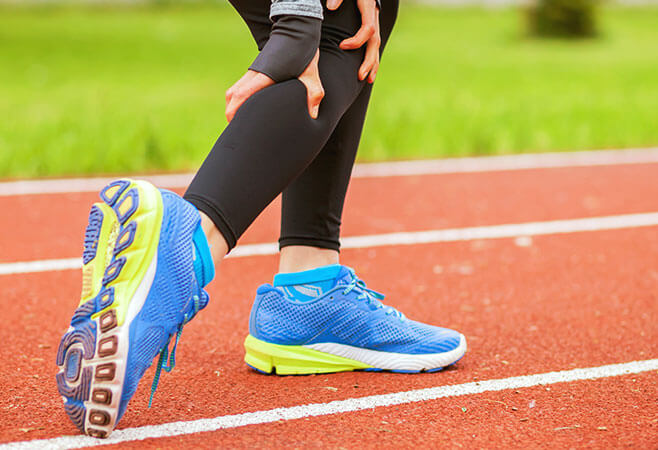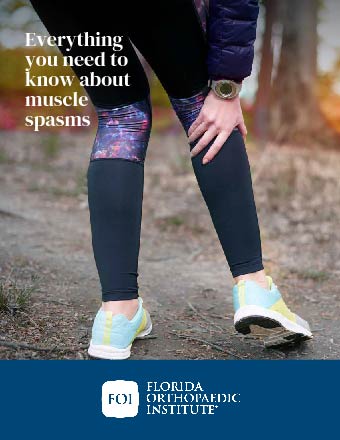Knee muscle spasms
Muscle spasms are involuntary contractions of a muscle. They occur suddenly and do not relax for a few seconds to several minutes. Several factors or triggers may cause muscle spasms, such as strenuous exercise and dehydration. These events may occur in only a part of a muscle, a structure in its entirety, or a muscle group. In most cases, muscle spasms can be treated with home remedies, but the muscle spasms may be a symptom of another condition that needs medical treatment. It is important to regularly stretch and condition your muscles to prevent muscle spasms altogether.
Muscles are critical physical features found throughout the body. They enable you to perform many important actions, such as performing basic movements, maintaining your posture, helping other physical components remain stable, and generating body heat.
These responsibilities increase a muscle’s risk of injury. One common problem affecting muscles is known as spasms or cramping.
Anatomy
Muscles are bundles of fibers that contract and expand, which causes movement. When these muscles are regularly stretched and conditioned, their bundles of fibers lengthen, allowing them to contract and tighten more vigorously during exercise. Muscles that are poorly conditioned are more susceptible to fatigue, which can alter spinal neural reflex activity. When muscles are tired, their oxygen supply is depleted, leading to the buildup of waste products and spasms. When a cramp begins, the spinal cord stimulates the muscle to keep contracting.
About
A muscle spasm, also known as a muscle cramp or “charley horse,” is an involuntary contraction of a muscle that occurs suddenly and does not relax. Although knee muscle spasms can happen to any muscle, the most commonly affected muscle groups are:
- Back of the lower leg/calf
- Back of the thigh
- Front of the thigh
- Feet, hands, and arms
- Abdomen and ribcage
The exact cause of muscle spasms is unknown. Factors such as poor stretching and conditioning, muscle fatigue, exercising or working in intense heat, dehydration, and depletion of salt and electrolytes contribute to muscle spasms.
Those who are at the highest risk of getting muscle spasms include infants, young children, and people over the age of 65. Other factors that can put people at a greater risk for muscle spasms include:
- Certain medications
- Being overweight
- Illness
- Overexerting during work or exercise
Muscle spasms are most common among athletes – specifically endurance athletes like marathon runners.
Causes
Spams might result from several underlying causes, including:
- Tense muscles
- Poorly conditioned muscles
- Heat exhaustion
- Dehydration
- Nerve damage
- Limited blood supply
- Significant or chronic physical, mental, or emotional stress
- Overuse
In some instances, spasms that cannot be traced back to any specific cause or no known reason and are called idiopathic muscle spasms.

About knee muscle spasms
Knee muscle spasms range in intensity and can be mild to extremely painful. Sudden and intense pain is usually the benchmark symptom of a muscle spasm. This discomfort often is a burning, stretching, or tearing sensation. The pain typically lingers for anywhere from several seconds to hours. Additionally, the stricken muscle might twitch and feel hard and tender to the touch. When experiencing a muscle spasm, the muscle may appear visibly distorted. These spasms can last from a few minutes to a few hours and may reoccur many times before they go away.
Diagnosis
Although most muscle cramps are non-threatening, sometimes they can indicate a serious medical condition. See your Florida Orthopaedic Institute physician if your cramps are severe, happen frequently, respond poorly to simple treatments, or are not related to obvious causes like strenuous exercise. It is possible that you may have problems with circulation, metabolism, hormones, nerves, nutrition, or medications.
Muscle spasms can be a symptom of many conditions that range from minor to severe, such as spinal nerve irritation or compression, thyroid disease, narrowing of the spinal canal, hardening of the arteries, chronic infections, cirrhosis of the liver, and Lou Gehrig’s disease.
Your Florida Orthopaedic Institute physician will check all other symptoms you may have, decide what your exact condition is, and create a treatment plan based on the results of your diagnosis.
It is important to remember that spasms usually result from a specific underlying problem, so doctors must identify that issue before creating any type of treatment plan. In many instances, diagnosing a muscle spasm is a multi-step process beginning with questions about your medical history, such as:
- What actions bring forth the spasms?
- When did the problem start?
- Do any movements worsen the pain?
- How long has the problem been taking place?
- Do any other symptoms accompany spasms?
- Have you been diagnosed with any health conditions?
- Your diet?
- What leisure activities do you participate in?
Doctors might also ask about your stress levels, your fitness, and your sleeping patterns. After gathering this information, your doctor will likely perform a visual exam of the afflicted muscle or muscles, looking out for any apparent abnormalities suggesting possible injury. They may also perform various tests to identify medical problems capable of causing muscle spasms, like dehydration, nutritional deficiencies, or low electrolyte levels.
Treatment
The therapy your doctor chooses will depend on the underlying cause.
The best treatment for a sudden (acute) event is time. Most muscle spasms do not last for prolonged periods. When one happens, you may be able to ease your discomfort through immediate efforts such as:
- Stretching the ailing muscle
- Massaging the aching physical feature
- Moving or walking around
- Using over-the-counter pain-relieving medications only as directed and for a brief time frame
You might also lessen your pain by applying ice and heat alternately.
Home treatments
Muscle spasms usually go away on their own without having to see a doctor. But when a muscle spasm occurs, you should:
- Stop whatever activity triggered the cramp
- Gently stretch and massage the muscle, holding it in a stretched position until the cramp goes away
- Apply heat to tight/tense muscles
When to see a doctor
You should seek medical attention if spams cause severe discomfort or limit your ability to perform routine tasks, are accompanied by swelling or skin rashes, create noticeable muscle weakness, occur with increasing frequency, or do not improve after using self-care methods.
Prevention
It may be difficult to prevent muscle spasms. You may be able to lower their risk by:
- Drinking adequate amounts of water
- Consuming a nutritious and balanced diet
- Obtaining enough exercise
- Preparing muscles for physical activity through stretching and loosening exercises
- Getting enough sleep
- Participating in productive stress-busting activities
Other possible preventative measures include adequately fitting footwear, maintaining a healthy weight, and, whenever possible, not working out or performing any other strenuous tasks in warm weather.

Learn everything you need to know about muscle spasms in our downloadable guide.
Related specialties
- ACL Injuries
- Arthroscopic Chondroplasty
- Articular Cartilage Restoration
- Deep Thigh Bruising
- Fractures of the Tibial Spine
- Iliotibial Band Syndrome
- Lateral Collateral Ligament (LCL) Injuries
- MACI
- Medial Collateral Ligament Injuries
- Meniscus Tears
- Muscle Strains of the Calf
- Partial Knee Replacement
- Patellar Fracture
- Quadriceps Tendon Tear
- Runner's Knee
- Senior Strong
- Shin Splints
- Total Knee Replacement Surgery
